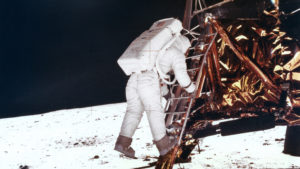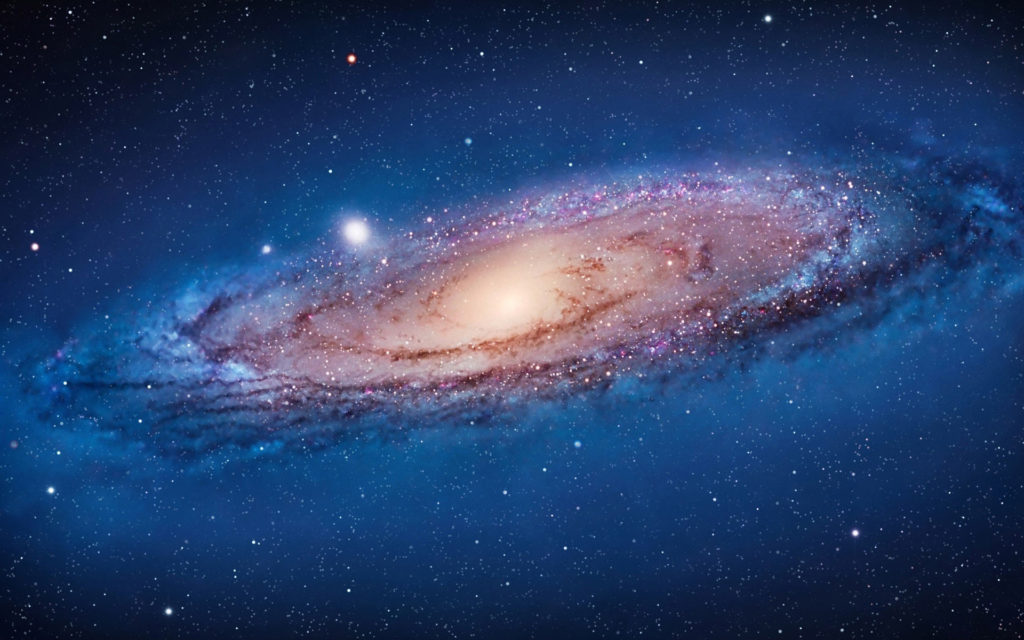
On July 20, 2019 we will celebrate the fiftieth anniversary of the Apollo 11 moon landing. People of my generation thought that the Apollo project was just the first step in what would be steady progress toward the human exploration of the solar system and beyond. In that expectation, we were cruelly disappointed. Partisan politics, a collective failure of will and ambition, and, yes, US victory in the Cold War all played a part, because the US space program of the 1960s through the 1980s was more about perfecting technologies for defeating the Soviet Union than about pursuing knowledge for its own sake. Still, our abandoning the dream of human exploration of space was seen by me and my generation as a great betrayal. And, yes, it was a betrayal, not just of the dreams of my science-loving sisters and brothers of that era, but of all of humankind.
Fifty years have passed and, happily, we have once again recommitted to putting humans on the Moon, Mars, and beyond. It is important that we detach ourselves from the momentary, political motivations of figures like current NASA director and Trump appointee, Jim Bridenstine, and the commercial motivations of entrepreneurs like Elon Musk and Jeff Bezos, however much one appreciates the impetus such figures have provided for a renewed focus on human space exploration. Concentrate, instead, on the more fundamental reasons for putting humans in space.
If it were just a matter of gathering new knowledge of distant planets and moons, human space travel would not be needed. Robots can do that as well as or better than humans, at far lower cost, and with zero risk of harm to human astronauts. But one of the most compelling reasons for human space exploration is precisely because it is difficult, dangerous, and expensive. This was the reason so eloquently voiced by John Kennedy at Rice University in Houston in September of 1962:

“We choose to go to the Moon in this decade and do the other things, not because they are easy, but because they are hard, because that goal will serve to organize and measure the best of our energies and skills.”
We embrace the big challenges because, in doing so, we make ourselves better, smarter, stronger, and more courageous, and our doing that is worth the cost and the risk. Of course there are other difficult challenges. A colleague said to me recently that the internet, robotics, and AI revolutions are this era’s Apollo program. We have certainly made ourselves smarter in this way. What is missing in these initiatives, however, is a moral challenge. There are plenty of ethical questions posed by these new, technical achievements. But mastering these merely technical and intellectual challenges stands little chance of promoting the moral growth of individuals and communities. In this respect, a more appropriate analogue of the challenge of human space exploration would be the challenge of the climate emergency. Mastering that will make us smarter and it will require both individual and collective courage along with other virtues, such as compassion, mercy, self-sacrifice, and generosity. It is also like the challenge of putting humans in deep space in that it is a necessary response to an existential threat to humankind.
That last point brings us to the most fundamental, moral argument for redoubling our efforts to establish a human presence elsewhere than on Earth. The ultimate problem is that the Earth cannot be a permanent home for the human species. It’s only a matter of time. That time will be short, perhaps no more than a few hundred years, if we don’t put a halt to climate change and remediate the harm done by global warming. But if we do solve that problem, it’s still only a matter of time. The time we have left on Earth might be measured on scale of centuries or millennia were the planet to be rendered uninhabitable by another meteor impact with a magnitude like that which caused the Cretaceous extinction. Should we escape that fate by luck or clever preventive measures, it’s still the case that, on a yet longer time scale, Earth will become uninhabitable for reasons of simple physics. It might be only a few hundred million years before solar evolution, with steadily increasing solar radiation, does to the planet what anthropogenic climate change is doing now.
Clever humans can and probably will find ways to accommodate us to living on a planet much warmer than the Earth is now. But, in the end, it will all be for naught if we fail to find a way to establish new homes for human civilization elsewhere in the universe.
Some will say that this argument is an instance of speciesism. It isn’t, for we can choose to take along as many non-human species as we wish, and some, of course, will be necessary for our own survival.
Some will say that the heat death of Earth due to solar evolution is so far in the future as to be of no practical concern for a long, long time to come and so does not require our mastering off-Earth human habitation now. That’s true. There is no immediate necessity. But why wait? It’s a really hard problem, so, the sooner we get started, the better.

Some will say that a concerted effort to establish a human presence off-Earth will distract attention and divert resources from the more urgent challenge of global warming. That could happen, if we were stupid. But it’s not a zero-sum game. We can tackle both problems at the same time, just as we first went to the Moon while fighting an illegal and immoral war in Vietnam and, perhaps unwisely, building a massive nuclear arsenal and delivery capability. There will also be spill-over effects between both projects, as with the first, really effective solar cells having been developed by Bell labs for use in outer space, not for green electricity generation on Earth.
If we can do it, if we can find a way to transplant human life and civilization to new homes in space, then our descendants millions of years from now will look back to us with the same gratitude that we should feel for our hominid ancestors who first mastered the use of fire some two million years ago. The human project already has a history measured on a scale of millions of years. We need to think about the future of the human project on a similar scale, and we must take seriously our moral obligations to those who will come after us.
Per aspera ad astra.
